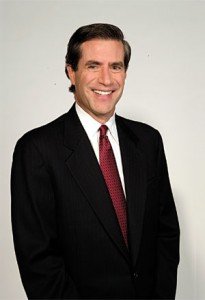Hard-hitting Newsman, Weaver of Tales
By Helen Mondloch

With its whimsical verses and dazzling illustrations, “Woodrow for President: A Tail of Voting, Campaigns, and Elections” presents a version of the American political process unstained by the cynicism that pervaded much of this election year. Starring a be-speckled mouse running for executive office, the picture book is part of an ongoing collection found in gift shops and school libraries nationwide, each bearing a similarly lighthearted title—like “Liberty Lee’s Tail of Independence,” or “Marshall, the Court House Mouse”—and designed to inspire young readers with a passion for American history and government.
Every now and then, the books deliver a dash of subtle wit apparently aimed at adults who read the books to kids—and who are no strangers to the shenanigans of real-world politics. In “Woodrow, the White House Mouse,” a foreground illustration of the presidential library features several tongue-in-cheek titles, including, “’Keeping Political Promises,’ by I. Brakum Daley.”
Maybe it’s no wonder, then, that the books are written by a seasoned journalist who has reported on the national scene for nearly 30 years. Peter Barnes, a longtime Alexandria resident, is the senior Washington correspondent for Fox Business Network, located on bustling North Capitol Street downtown. Since the collapse of the housing market in 2008, Barnes has tirelessly pursued the forces at play in a troubled economy, covering the latest developments with an on-air demeanor that is casual but bracing. He calls the ongoing economic crisis “the biggest story of my life.” Prior to joining Fox in 2007, he worked the business beat at several other agencies, including rival station CNBC, where he delivered news and anchored talk shows.
Over the years, this hard-hitting newsman with the silver-spackled hair has also found time for fancying tuxedoed mice inhabiting the White House and other monuments of American grandeur. Barnes’ twin passions for telling “tails” and delivering feckless news reports spring, he claims, from a common source—and certainly make him an uncommon newsman.
DREAMER AND PRAGMATIST
Born in Rochester, New York and raised outside of Philadelphia, Barnes, 52, says that his various scholarly penchants hearken back to his early days, when he dreamed of becoming a novelist. “When I was a kid, I loved writing; I was a book worm, a nerd. I used to write short stories, poetry and all kinds of other stuff,” he recalls. In high school, he also acquired an unbridled passion for politics.
In tenth-grade, he eagerly attended a lecture by famed novelist and World War II correspondent James Michener on the campus of Swarthmore College. The experience “scared me straight,” says Barnes. He recalls that Michener asked the crowd, “How many of you folks out there want to be novelists?” Hundreds of hands, including young Peter’s, went up, prompting the speaker to deliver a grim dose of reality: The average yearly income for fiction writers was $3,000. Barnes recalls that Michener deadpanned, “You’ll starve!”
The author went on to salve his listeners with some practical advice that struck a chord with at least one budding writer in the audience: Take up journalism. Seek out writing opportunities, he urged, then get a paying job as a reporter—and write your great American novel on the weekends.
That same afternoon, Peter caught up with the crossing guard at his school, a man named Ellis Bishop, who was known to moonlight at the local Penny Saver newspaper. “Mr. Bishop, I want to be a journalist!” he proclaimed. The man helped Peter enlist as the paper’s sports stringer—his first venture into the world of news media. He soon joined the staff of the school newspaper, eventually becoming editor. A few years later, he did the same at Penn State, where he earned a wealth of writing experience and a degree in political science.
“It was in 1980, while doing an internship at the Wall Street Journal that I just fell in love with business and economics,” recalls Barnes. “But I realized that I didn’t know what I was talking about as a business and economics correspondent,” he laughs. The realization prompted a break with the internship so that he could enroll in business school at the University of Pennsylvania’s Wharton School, where he earned an MBA in finance.
Barnes put his newfound savvy to use when the Journal hired him as a reporter in 1985. He later did stints in Los Angeles, Greensboro and Charlotte. He broke into broadcast beginning in 1993 as the Washington correspondent at CNBC. It was there that he met Roger Ailes, today the president of Fox News Channel, who in 2007 would hire Barnes to help launch the more specialized Fox Business Network. Before joining Fox, Barnes served as Washington bureau chief for the television station group Hearst-Argyle and at several other outlets, never letting up on his pursuit of breaking business news.
VERY SPECIAL BOOKS
Somewhere along this whirlwind career path, Barnes began studying niche marketing and became smitten by the cupid of entrepreneurship. That—combined with his love of books—spurred him into the world of children’s book publishing.
No less significant, in 1990 he married Cheryl Shaw Barnes, a woman with a vivid imagination and a talent for drawing dazzling pictures.
Like the epiphanic afternoon when he heard Michener speak, the day that Peter and Cheryl Barnes alighted with the idea of publishing a book is one that Barnes is clearly fond of recounting. It took place in the summer of 1992, when the couple was vacationing on Nantucket, the quaint Massachusetts island that Barnes had frequented as a child and where his parents had now moved. (“My father was a crazy fisherman,” he explains.) One afternoon while awaiting a ferry boat, he and his wife were browsing a waterfront bookstore when they overheard a tourist ask the owner if he had any children’s books about the island. For the Barnes’, the answer became a brainchild: “No, but if we did, we’d sell a million copies.”
Peter soon embarked on writing “Nat, Nat, the Nantucket Cat.”He and Cheryl hired an illustrator and created a company called VSP books—specializing in books about “very special places.” Released to island bookstores in the fall of 1993, Nat sold about 1,000 copies in two months and some 5,000 copies the following summer.
The couple applied the same concept to “Alexander, the Old Town Mouse,” about Cheryl’s home town of Alexandria, where they now resided. Cheryl, who has a background in architecture, became the illustrator.
Eighteen more books would eventually follow as the husband and wife team took on a broader aim—educating young readers about the national historic sites and institutions of Washington, DC. At first, the new books sold mostly in downtown venues, but before long, says Barnes, teachers who were visiting the nation’s capital began taking the books back home and showing them to their curriculum specialists. Offering adventure-filled “tails,” the books could be used as primers on how the nation established and maintains its system of governance—for teachers, a formidable tool in the new high-stakes race to meet standards of learning. The rhyming verses would not only make the content appealing but also accessible, especially to kids who struggled with reading. (The use of rhyme was inspired by the Barnes’ older daughter, Maggie, now 30, who suffered with dyslexia as a child. Their younger daughter, Katie, is 28.) The breathtaking detail and authenticity of Cheryl’s illustrations—especially in books about the White House and Capitol building—also appealed to educators, including those at Scholastic Books. In the late ’90’s the company published several of the Barnes’ titles in paperback, selling more than 300,000 copies to schools.
To date the couple has sold another half-million copies in hard-cover. Between 2005 and 2007, Barnes took a sabbatical from his news desk and, together with Cheryl, tended to the publishing company full time. By then they had received awards and accolades in the national media. VSP had also published a few titles by other authors, including the widely acclaimed best-seller, “Heartsongs,” by Mattie Stepanek, a boy who suffered from muscular dystrophy (and who passed away in 2004).
But like a lot of the companies that Barnes has reported on in recent years, VSP took a hit in a bad economy. Last year as the Barnes’ were attempting to liquidate their stock, a large publishing house called Regnery proposed a way to keep Woodrow and the other mice alive: The publisher would create an imprint called Little Patriot Press (the name was Cheryl’s idea), specializing in children’s books about American history and government. The imprint would re-release seven of the Barnes’ old titles and commission them to produce two more—including “Madison and the Tail of the Constitution,” due out in May 2013.
But it’s no simple task to compose an engaging children’s book about a subject as weighty as the birth of the U.S. Constitution. “You don’t want to write a boring textbook. You don’t want a lot of pictures of guys sitting around talking,” says Barnes.
So instead you conjure a tale about a family struggling to make ends meet in early America. The father is a farmer and a veteran of the Revolution who worries that he’ll be sent to debtors’ prison. The newborn nation is in disarray. There are pirates—“Kids love pirates,” smiles Barnes—and noisy rebellions (e.g., Shay’s). Enter a brave mouse named Madison who dwells in the floor boards of the family’s home. He ventures a perilous journey to Montpelier, home to human patriot James Madison. There he meets up with other brave hearts, they all end up in Philadelphia, and somehow (it will all make sense in the book, of course) they save the day by crafting the most magnanimous document known to mouse and man.

OFF TO THE RACES
On most days Madison and his fellow patriots sleep while their author tends to pressing issues in real time—like a stagnant jobs market, or the economic impact of the this year’s drought.
Typically, Barnes rises by 6 a.m., grabs coffee and yogurt, and heads down to the basement of his Belle Haven home. He folds his iPad over the bar of his treadmill, logging on to the latest buzz in the world as he gets himself moving.
Around 8:30 a.m. he arrives at the office, where “it’s off to the races.” This morning he is scrambling together some notes for an impromptu interview with Secretary of Agriculture Tom Vilsack, who will shed some light on food prices and a hotly contested farm bill. As the cameras roll, Barnes poses probing questions and listens in his usual manner, lips slightly pursed and eyebrows knit.
Sometimes he heads over to the White House to cover a press conference or breaking news. At least once a year, he boards a press plane for an international summit meeting—a G-8 or G-20. His most thrilling sojourn took place in the fall of 2010, when he joined an entourage of reporters trailing President Obama’s flights to India and other Asian countries. He still marvels that the ten-day trip took them across the Atlantic, Europe and Asia on route to those exotic destinations, then over the Pacific on the way home—literally a trek around the world.
While Barnes and his wife have talked about their books on a number of daytime television shows, including the “Today Show,” most people never make the connection between Barnes the worldly newsman and Barnes the weaver of mouse tails, he says. In some 60 million American homes that have access to Fox Business Network, the average viewer apparently has no clue. “People are always shocked that it’s the same person,” he laughs.
WAXING PHILOSOPHICAL
Asked to comment on the gravely serious matters facing the world he reports on—what direction the economy is headed in, what role the government should play in reviving it, what impact the new healthcare law will have—Barnes mostly demurs. Since day one of his career, he has insisted on staying mum on the subjects he expounds in his news coverage. “I’m a reporter, not an opiner,” he says.
He is willing to say this much: He believes the American economy will remain in “slow growth mode for the next several years.” He does not agree with those who forecast another recession. His eyes look somber as he adds, “This has been a terrible and difficult time. We all have friends who are out of work right now. I want it to be over.”
Asked if he ever grows disillusioned with the forces commonly accused of stalling economic recovery—polarized politics, a divisive media—Barnes shoots back with, “No, never! It’s an exciting time to be in journalism, and an exciting time to be in Washington. We are having debates about fundamental questions in our society. I love reporting on the clash of ideas!”
Barnes also seems to savor the chance to wax philosophical about America’s founding principles. One of his favorite books is “The Rise of American Democracy,” by Sean Wilentz. “I bought cases of the book and gave them to friends,” he recalls. The book affirms the idea that the American system of checks and balances seeks to ensure that change is both slow and difficult. “It’s exactly what the founders envisioned,” he notes.
All of which brings the conversation back to those adorable mice. Like his heady job at the Fox Business Network, composing picture books about a very special country allows Barnes to exercise his core passion for knowledge and history. “I’m still the nerdy guy I was in high school,” he says.
(November 2012)




